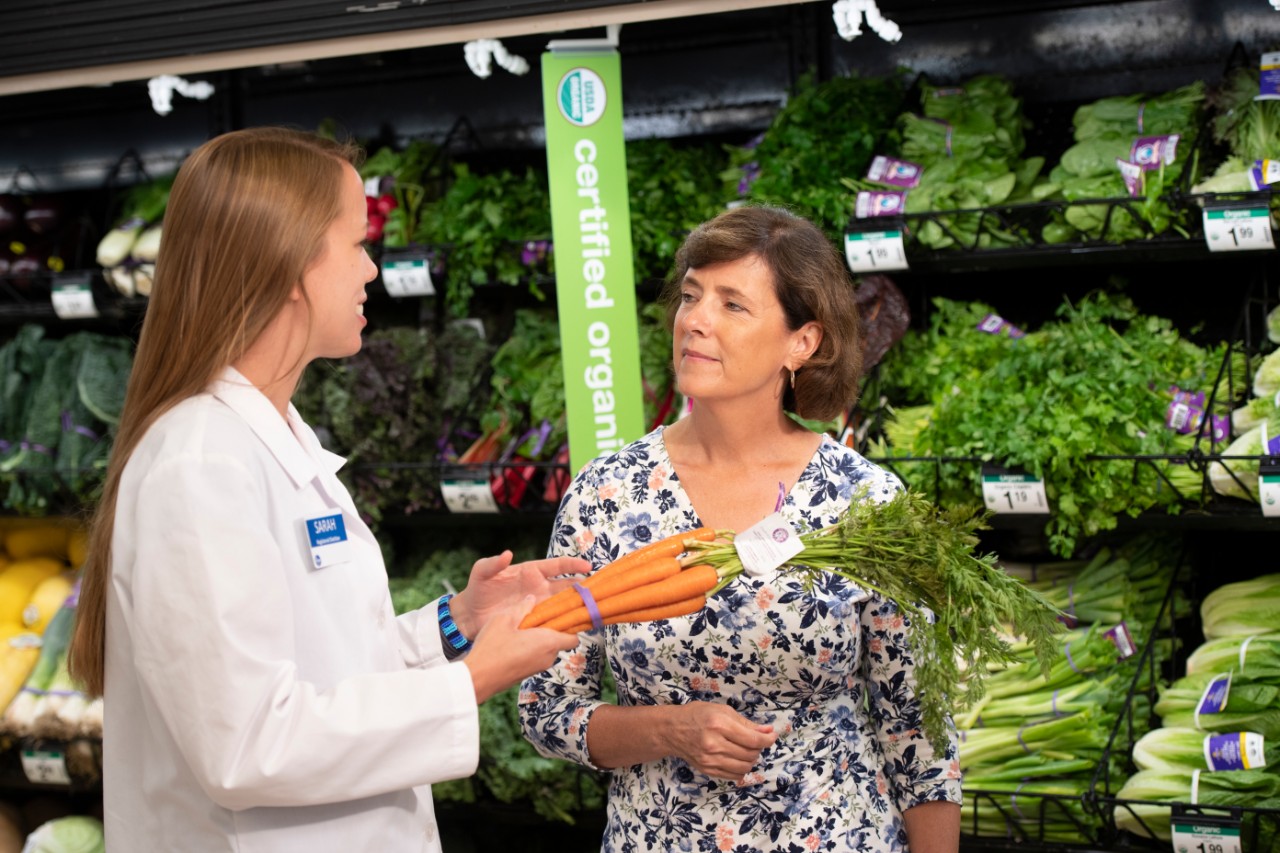
UC, Kroger form research collaboration to improve health outcomes
SuperWIN study shows impact of retail-based dietary interventions
The University of Cincinnati, UC Health, Cincinnati Children’s and Kroger have partnered to help study how to make health care more accessible to consumers in a first-of-its kind clinical trial designed to improve health outcomes through retail-based dietary interventions.
The Supermarket and Web-based Intervention Targeting Nutrition (SuperWIN) study is a partnership to improve the quality of dietary intake. Results of the study showed improved adherence to the Dietary Approaches to Stop Hypertension, or DASH, diet.
The study population was 247 UC Health patients with at least one cardiovascular risk factor: obesity, hypertension and/or hypercholesterolemia. All study members were shoppers at a Kroger study store with no previous experience with online shopping.
“SuperWIN is probably the most scientifically rigorous study of a comprehensive health care intervention ever conducted with the retail industry,” says Dylan Steen, MD, of the Division of Cardiovascular Health and Disease at the UC College of Medicine. “In terms of purchasing data, retailers have been collecting these data for decades. These data are now progressively being linked to nutrition information and thus could be used by dietitians, nurses, pharmacists, and physicians to provide the best, individualized guidance to patients.”

Dylan Steen, MD, Division of Cardiovascular Health and Disease at the UC College of Medicine. Photo/Andrew Higley/UC Creative + Brand
The study participants were provided a new Kroger Plus card and randomized into three separate groups — control, Strategy 1 and Strategy 2. All three groups started with a medical nutrition therapy visit delivered by a Kroger dietitian at each participant’s preferred Kroger shopping location. The control group received no further education. In the Strategy 1 and Strategy 2 groups, participants received six additional in-store, individualization food product-directed education visits delivered by the same Kroger dietitian. At the beginning of every Strategy 1 and Strategy 2 visit, the dietitian reviewed with her participant updated purchasing reports provided by the study in order to guide the visit.
“The participants were taught to shop better, right in the aisles of their home stores, based off each individual’s unique tastes and needs,” says Steen.
In addition, participants in the Strategy 2 group were introduced to new technologies to support healthier purchases and dietary intake. These included Kroger.com for online shopping, home grocery delivery by The Grocery Runners, OptUP for making healthier purchases, and Yummly for healthier recipes and meal planning.
“Retail dieticians have expertise in giving their customers in-store tours and showing them different food products and best food choices to manage different diseases like diabetes and cardiovascular disease,” says Sarah Couch, PhD, of the Department of Rehabilitation, Exercise and Nutrition Science in the UC College of Allied Health Sciences, who designed the dietary portion of SuperWIN.
“The DASH diet has been well researched and shown to help lower blood pressure and modify lipids and to help with weight loss if it's calorically controlled in adults,” she says. “We know it works but getting people to change their diet to comply and keep following this dietary pattern long term has really been a challenge nationally.”
All groups had follow-up visits at 3 months and 6 months were conducted to evaluate adherence to the DASH diet, food literacy, and some key health metrics such as weight and blood pressure.
“Patients with cardiovascular risk linked to dietary choices face enormous challenges,” says Bernard Lenchitz, MD, professor in the UC College of Medicine Department of Internal Medicine, and vice president of the UC Health Primary Care Network. “This landmark study clearly demonstrates that retail-based interventions augment traditional office-based primary care.”
The results of the study show on average, participants who engaged with a Kroger dietitian in aisle-by-aisle education and practice, both Strategies 1 and 2, had a greater increase in their adherence to a DASH diet than the control group. Participants who were also introduced and trained on new technologies, Strategy 2, had an even greater increase in adherence to the DASH diet than those who did not receive this training.
“Dietary interventions could be studied across larger populations. Tele-nutrition visits could be added to in-person visits. There are many possibilities. These interventions, individually or together, could be tailored to almost any chronic disease.
Dylan Steen, MD
Online shopping, grocery delivery and use of nutrition and health care applications are rapidly rising globally. Steen says there are many reasons why these tools could improve both purchase and dietary quality.
“SuperWIN provides evidence of the efficacy of incorporating online training and tools to improve dietary quality,” he says. “Scientific organizations have been calling for research to determine whether these technologies can help us address some of the major public health barriers around improving nutrition, both in high and low income communities. For some patients with physical limitations preventing travel to a grocery store, these services will likely make it easier for them to follow the very specific dietary recommendations that are essential to managing their chronic conditions and improving their quality of life.”
Couch says she’s confident the SuperWIN results can make a true impact on the nation’s health because it is all about educating consumers and providing them with the necessary skills to make healthy food choices.
“They need to know how to select healthful products by learning how to read labels and what to look for when comparing products,” she said. “They need to understand how to plan their meals because meal planning is so essential to helping people stick to a plan. Also, once they get the food home, they need to know how to prepare that food to be most healthful. All the elements of food literacy were woven into the intervention design and that relates to giving people the knowledge and skills about the food they eat to enable them to comply with a healthy dietary pattern like DASH.”
Steen says the results of SuperWIN have laid the foundation for new era of research between independent academic researchers and retailers.
“Dietary interventions could be studied across larger populations. Tele-nutrition visits could be added to in-person visits. There are many possibilities,” he says. “It is important to note that dietary education visits could be combined with retail-based medication-focused visits or monitoring visits. These interventions, individually or together, could be tailored to almost any chronic disease.”
“A transition to value-based care is urgently needed,” says Steen. “Retail-based interventions, like those studied in SuperWIN, can be integrated into clinical care provided by primary care clinicians and specialists to support this transition. We already know that consumers want high-quality with greater convenience, access and lower costs. If you ask yourself how we, as a society, are going to extend the reach of health care beyond hospitals and traditional medical settings, it becomes readily apparent that this is the most promising path forward.”
Lead photo of Sarah Limbert, left, Kroger dietitian and UC graduate and Sarah Couch, PhD. Photo/provided
Next Lives Here
The University of Cincinnati is classified as a Research 1 institution by the Carnegie Commission and is ranked in the National Science Foundation's Top-35 public research universities. UC's medical, graduate and undergraduate students and faculty investigate problems and innovate solutions with real-world impact. Next Lives Here.
Related Stories
Intrapreneurship: Strategies to promote internal innovation
February 27, 2026
Intrapreneurship encourages employees at large companies to innovate and test ideas with an entrepreneur’s level of freedom. Learn how to become an intrapreneur in your organization.
'Paradigm-shifting' study confirms effectiveness of long-acting HIV treatment
February 26, 2026
The results of a clinical trial involving the University of Cincinnati, recently published in The New England Journal of Medicine, show people failing HIV treatments with oral medications were able to be treated successfully using injections.
How do horses whinny?
February 26, 2026
A horse makes the low-pitched part of its whinny by vibrating its vocal cords — similar to how humans speak and sing — and the high-pitched part by whistling with its voice box, according to a new paper published in the journal Current Biology and featured in Smithsonian magazine.
